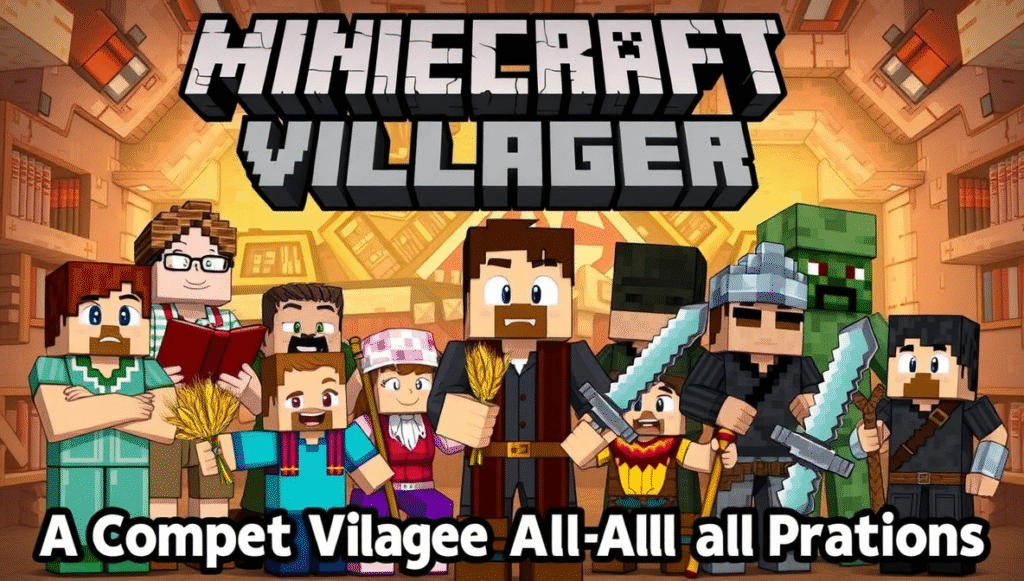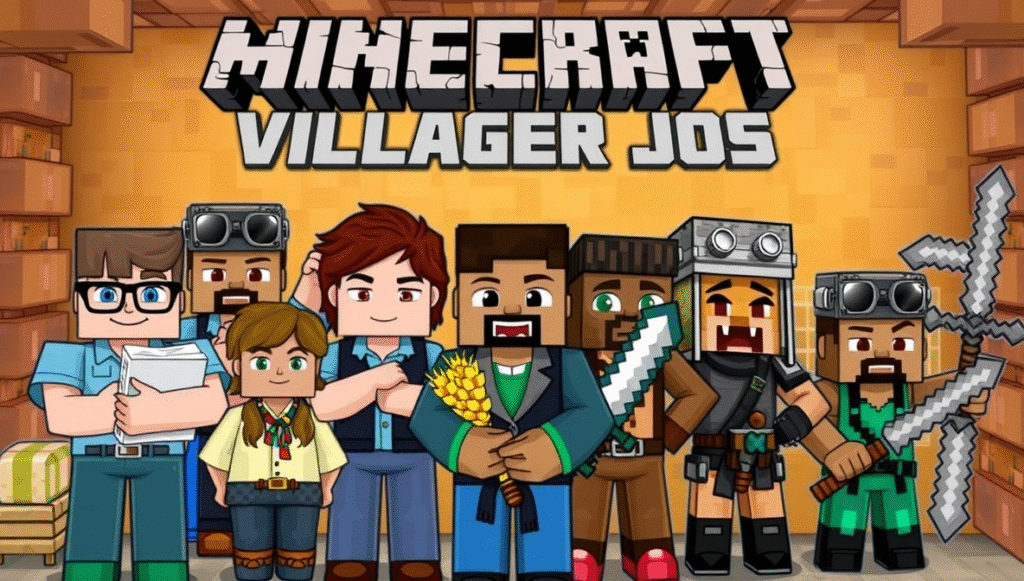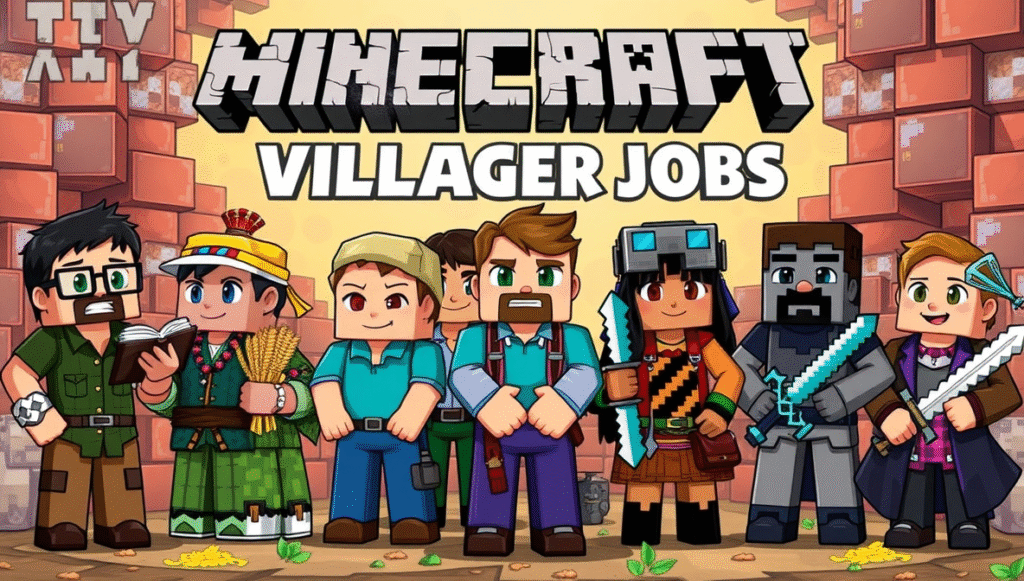Minecraft Villager Jobs are very important if you want to make your village lively and useful. Every villager has a special job that helps the village grow. Some villagers are farmers, who grow crops and provide food. Others are librarians, who can trade enchanted books. Villagers like blacksmiths give you weapons and tools, while clerics can give you valuable magical items. Knowing all minecraft villager jobs will help you trade better and get rare items faster. Each villager has a special building or workstation that matches their job. You can also change a villager’s job if you need different trades. By understanding how villagers work and what jobs they do, you can make your village stronger, get better items, and have more fun while playing Minecraft. Villager jobs make the game more interesting and rewarding for every player.
Minecraft villager jobs are not just for trading, they also make your village look more realistic and alive. There are many different jobs, like farmer, fisherman, shepherd, fletcher, librarian, cartographer, armorer, toolsmith, weaponsmith, and butcher. Each villager has a workstation that they use to do their job, and you can find these workstations in the village. For example, a farmer uses a composter, and a librarian uses a lectern. You can also level up a villager by trading with them, which unlocks better items and rewards. Changing a villager’s job is easy if you remove their current workstation and place a new one. Understanding minecraft villager jobs also helps you protect your villagers from zombies because you know which ones are important. By learning villager roles, you can create a thriving village and enjoy trading rare items that make your Minecraft world fun and exciting.

All Minecraft Villager Jobs and Their Workstations
Minecraft villager jobs are connected to specific workstations. Without a workstation, a villager cannot take a job. Here are all the villager jobs with their matching workstations:
- Farmer – Composter
- Fisherman – Barrel
- Shepherd – Loom
- Fletcher – Fletching Table
- Librarian – Lectern
- Cartographer – Cartography Table
- Armorer – Blast Furnace
- Weaponsmith – Grindstone
- Toolsmith – Smithing Table
- Butcher – Smoker
- Cleric – Brewing Stand
Each villager uses their workstation during the day. If the workstation is removed, the villager loses their job. This system lets you control which villager has which job in your village.
How to Trade With Villagers
Trading is the main reason villagers have jobs. Every villager offers different trades depending on their job and level. To trade, right-click on a villager. Novice villagers give simple items, but as you trade, their level goes up, unlocking better trades. For example, a novice farmer may sell bread for emeralds, but an expert farmer can sell golden carrots or pumpkins. Librarians start with basic books but eventually offer enchanted books. Blacksmiths can sell strong tools and armor. Trading is also the fastest way to get emeralds, which are the main currency in Minecraft villages. Always check which trades are available and focus on villagers that give rare or useful items.
How to Change a Villager’s Job
Minecraft villager jobs can be changed if needed. To do this, follow these steps:
- Remove the villager from their current workstation.
- Place a new workstation in the village.
- The villager will take a new job matching the new workstation.
For example, if a villager is a farmer but you want a librarian, break the composter and place a lectern nearby. The villager will become a librarian and start offering new trades. Keep in mind, villagers with existing trades or if they have been traded with cannot change jobs. This is why it’s better to plan your village carefully and decide which jobs are most useful.

Levels of Minecraft Villager Jobs
Each villager has five levels:
- Novice
- Apprentice
- Journeyman
- Expert
- Master
Leveling up a villager unlocks better trades. You increase their level by trading items. For example, trading wheat with a farmer villager increases their experience. Master villagers have the best trades and can provide rare items like enchanted books, diamond tools, or emeralds. Focusing on leveling important villagers ensures you get the best rewards from your village.
Rare Items From Minecraft Villager Jobs
Villager jobs are the easiest way to get rare items in Minecraft. Some examples include:
- Librarians – Enchanted books, name tags
- Farmers – Golden carrots, pumpkins
- Clerics – Ender pearls, bottles of enchanting
- Toolsmiths – Diamond pickaxes, enchanted tools
- Weaponsmiths – Diamond swords, enchanted weapons
Trading with the right villagers saves you time and effort. You don’t need to spend hours mining diamonds or finding rare items. Villager trades are a safe and easy way to get valuable resources.
Tips for Protecting Villagers
Zombies can attack and kill villagers, so protecting them is very important. Here are some tips:
- Build fences around the village.
- Place torches to prevent hostile mobs from spawning.
- Create iron golems to protect villagers automatically.
- Keep villagers inside buildings at night.
Knowing which villagers have important jobs helps you decide which ones to protect first. Losing a master librarian or an expert blacksmith can be a big loss.
How to Make Your Village More Fun With Villager Jobs
Minecraft villager jobs are not only useful but also make the village fun and lively. You can design streets with job-specific buildings. For example, place a library for librarians, a forge for blacksmiths, and farms for farmers. Watching villagers work and trade makes the village feel alive. You can even create a trading hub where all villagers are together. Villager jobs also add goals to your game, like collecting all enchanted books or trading for a full set of diamond armor.
Minecraft Villager Job Farming Strategies
Villager jobs can also help you farm items. For example:
- Farmers provide food for trading and survival.
- Fishermen can give you enchanted fishing rods.
- Shepherds provide wool for building.
Creating specialized areas for each villager job helps you get resources quickly. Trading efficiently also gives you emeralds to buy rare items from other villagers.

Conclusion
Minecraft villager jobs make the game more fun, helpful, and exciting. Each villager has a special role that provides items, resources, and rare trades. Knowing villager jobs helps you trade better, protect villagers, and level them up to get valuable rewards. Villager jobs also make villages feel alive and give players goals to achieve. By understanding workstations, levels, and rare items, you can create the best village and enjoy Minecraft fully.
FAQs
Q1: How many villager jobs are there in Minecraft?
There are 13 main villager jobs, including farmer, fisherman, shepherd, fletcher, librarian, cartographer, armorer, weaponsmith, toolsmith, butcher, cleric, nitwit, and unemployed villager.
Q2: Can I change a villager’s job?
Yes, you can change a villager’s job by removing their workstation and placing a new one. Villagers that have already traded cannot change jobs.
Q3: How do I level up villagers?
You level up villagers by trading items with them. Each trade gives experience points, unlocking better trades as they progress from novice to master.

